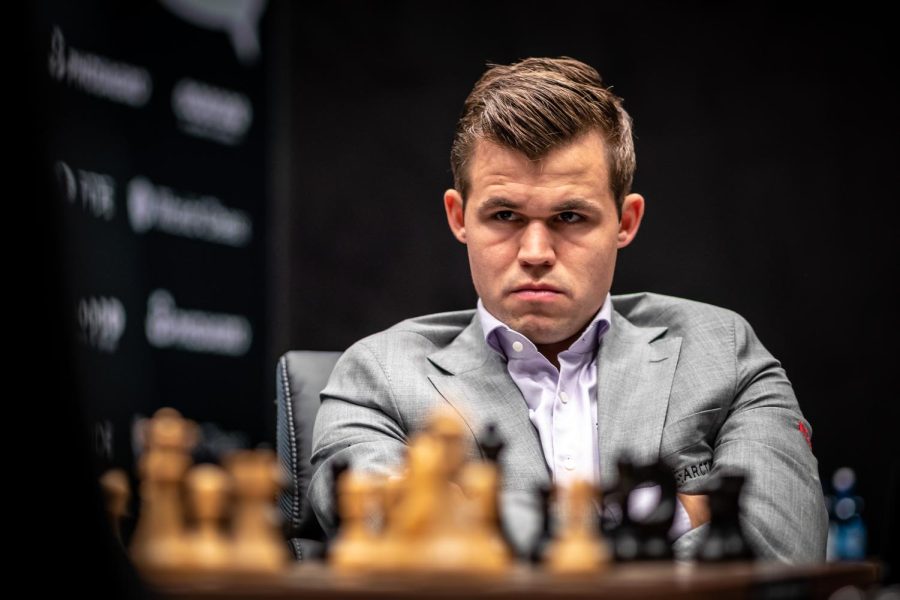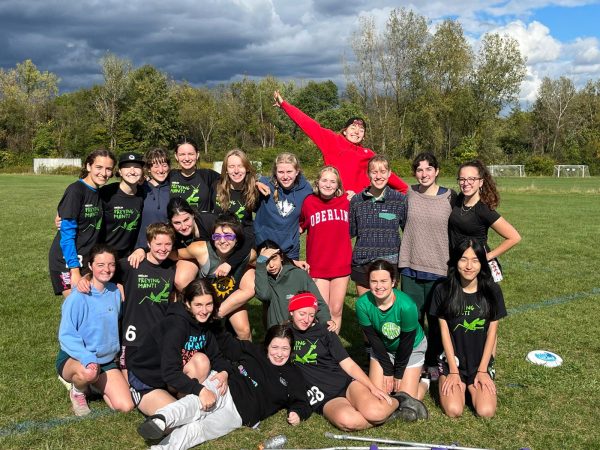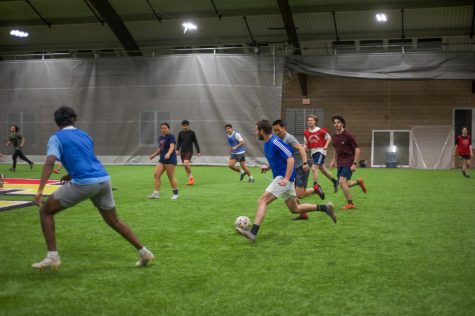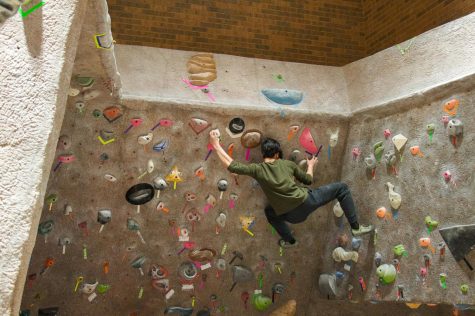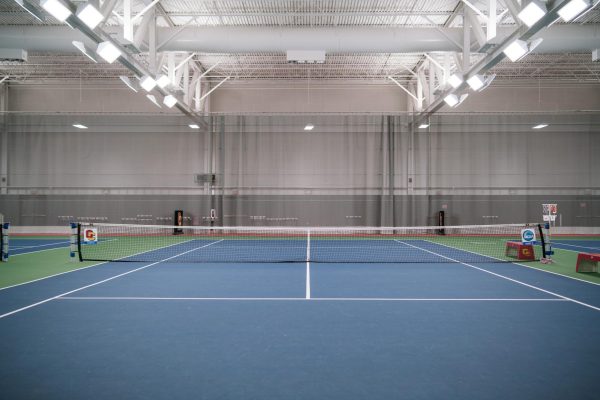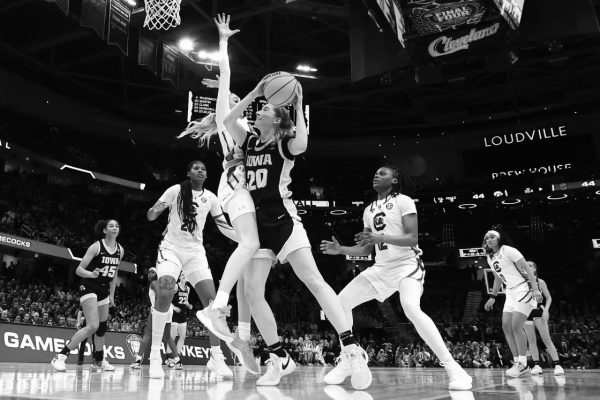Chess World Unpacks Carlsen, Niemann Scandal
Magnus Carlsen competes in a chess tournament.
Imagine Naomi Osaka hitting the ball once and walking off the court, or Tom Brady throwing a football to a teammate and leaving with no explanation. This is exactly what happened in the chess world recently, creating its largest scandal in years. On Sept. 5, 31-year-old Chess Grandmaster Magnus Carlsen withdrew from the Sinquefield Cup in St. Louis, MO after losing a game against 19-year-old Hans Niemann, giving up the chance to win $100,000.
According to the International Chess Federation, Carlsen has held the highest chess ranking for the past 11 years. He is known for his unbeaten streaks — earlier in his career, he had a 125-game unbeaten streak, the longest ever on record. Prior to the Sept. 5 game, Carlsen held a 53-game unbeaten streak. Earlier this year, however, he voluntarily relinquished his title as world chess champion, one which he held for the last nine years. When Carlsen withdrew from the Sinquefield Cup, it was the first time he had ever quit while in the middle of a tournament.
Niemann, on the other hand, is an up-and-coming chess player. His rating has skyrocketed over the past two years, demonstrating rapid improvement in his game. Chess streaming on websites such as Chess.com — the most popular chess website where people can virtually play with others of similar rank — gives visibility to younger up-and-coming players, which is how Niemann gained a fanbase.
Originally, Niemann wasn’t even supposed to play in the Sinquefield Cup, a competition for some of the best players in the world. He had been a wildcard candidate for another player, Richárd Rapport, who could not attend. Niemann came in with the lowest rating by far. He drew his first game and won his second. His next game — the one against Carlsen — wasn’t the first match between the two. In February they played a series of five games in a rapid chess tournament: Niemann won the first, then Carlsen squashed him in the next four.
This time, however, Niemann won his game against Carlsen. He won while playing with the black pieces, a rarity at the highest levels because white has the advantage of making the first move. In the post-game interview, Niemann claimed he scouted out some of Carlsen’s moves and then used an AI engine to analyze them. However, Niemann mentioned a move from a match that Carlsen never played, drawing speculation of how he really won.
The next day, Carlsen withdrew and posted a video clip on Twitter of Portuguese soccer manager José Mourinho saying, “I prefer really not to speak. If I speak I’m in big trouble, and I don’t want to be in big trouble.” Players in the tournament were offline and had no connection to the outside world during the tournament, so they could not see the video.
Niemann won his next game against Alireza Firouzja. At one point, he played queen to G3, a move that is near impossible to predict without a computer, which prompted many chess fans to back up Carlsen. Some people, including Chess Grandmaster Hikaru Nakamura, speculated that Carlsen dropped out because he believed Niemann cheated. For the remainder of the tournament, more anti-cheating measures were taken, but the chief arbiter said there was no evidence of cheating. In the recent past, chess players have cheated by looking at a phone during a bathroom break or having a bluetooth device in their ear.
Niemann stumbled during his post-game interview against Firouzja. Online, chess fans said he didn’t know what he was talking about and speculated that he wasn’t that great of a player. He suggested bad moves and ideas about what should be played, and his explanation for playing QG3 made little sense.
Niemann’s next game ended in a draw, and in his post-game interview, he finally addressed the cheating controversy. According to Niemann, he studied a different game from Carlsen than what he originally said in his first interview. He also explained his QG3 move, saying that it was meant to scare Firouzja and was not necessarily the best move. He also admitted to cheating twice in online chess, but when he was 12 and 16 years old.
Later that day, Chess.com, which is partly owned by Carlsen, banned Niemann from its website and events. In a statement, they claimed there was more information regarding his online cheating than Niemann had let on.
On Sept. 19, Carlsen and Niemann played an online rematch at the Julius Baer Generation Cup for preliminaries. On his second move, Carlsen resigned and turned off his camera as a form of protest, which confirmed that Niemann was the reason he quit the tournament. Carlsen hasn’t discussed the scandal since the tweet. He may have requested an official investigation, and during that time the player cannot address the situation.
Oberlin’s former chess club sponsor and Head Women’s Tennis Coach Constantine Ananiadis thinks that Carlsen handled the situation poorly.
“Especially for someone of his stature, influence, and platform, [Carlsen] should know better,” Ananiadis wrote in an email to the Review. “Everything he does and says is scrutinized and taken seriously. Even his decision not to play the world championship is disrespectful to the game of chess. Not sure if [the] game has gotten to him, but he’s acting strangely for sure. On one hand, it does bring publicity to chess. On the other, it’s negative.”
Conservatory second-year Evan Beachy believes Carlsen has a duty to speak out if he has evidence of foul play.
“I think Hans got good after quitting chess online, and the media is looking over the fact that it’s incredibly difficult to cheat — it’s not like they’re letting people get on their phones at this tournament,” Beachy said. “Magnus has a duty to say something. If he has good evidence to support it, he should come forward with it.”
There could be yet another Carlsen-Niemann rematch in the near future. Carlsen secured a spot in the Generation Cup’s knockout stage, and there’s a chance Niemann will qualify as well. They may face each other once more in the quarterfinals. But these players will not be looked at the same as they had been before the Sept. 5 game. Even if this isn’t a cheating scandal, both players will have their names attached to the controversy for the rest of their careers.


